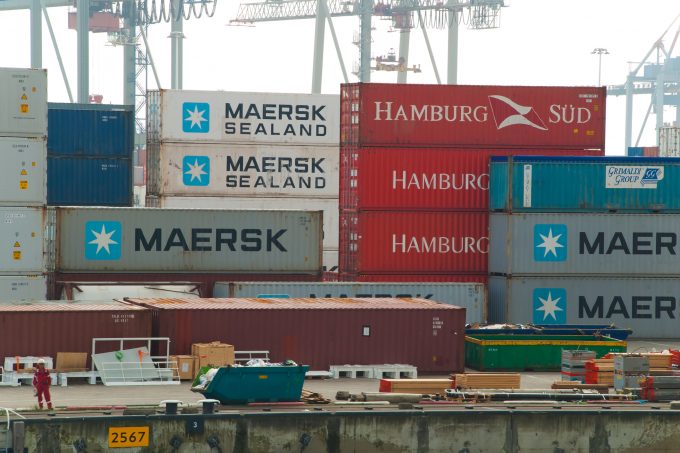Container spot rates have peaked as all major trades see prices fall
There was more evidence in this week’s container port freight markets that peak prices on ...
TFII: SOLID AS USUALMAERSK: WEAKENINGF: FALLING OFF A CLIFFAAPL: 'BOTTLENECK IN MAINLAND CHINA'AAPL: CHINA TRENDSDHL: GROWTH CAPEXR: ANOTHER SOLID DELIVERYMFT: HERE COMES THE FALLDSV: LOOK AT SCHENKER PERFORMANCEUPS: A WAVE OF DOWNGRADES DSV: BARGAIN BINKNX: EARNINGS OUTODFL: RISING AND FALLING AND THEN RISING
TFII: SOLID AS USUALMAERSK: WEAKENINGF: FALLING OFF A CLIFFAAPL: 'BOTTLENECK IN MAINLAND CHINA'AAPL: CHINA TRENDSDHL: GROWTH CAPEXR: ANOTHER SOLID DELIVERYMFT: HERE COMES THE FALLDSV: LOOK AT SCHENKER PERFORMANCEUPS: A WAVE OF DOWNGRADES DSV: BARGAIN BINKNX: EARNINGS OUTODFL: RISING AND FALLING AND THEN RISING

Maersk believes supply chains “are finally beginning to stabilise and find equilibrium”.
Indeed, its Asia-Pacific March update is generally upbeat, advising that demand across its network is either stronger, or is about to strengthen, particularly on secondary trades.
However, it said that consumers were receiving “mixed signals” on the state of their economies, and that weaknesses from the combination of high inventories – especially in North Europe – and low confidence in future consumer demand were a negative influence.
Picking out the positives, it said intra-Asia demand was “healthy” and that its services were “running at high to full capacity in most sectors”. Asia-Africa volumes were “picking up” and, as a consequence, African services blanked after the Chinese New Year were being resumed.
And on its Asia to Latin America trades, Maersk said a “volume pick up is expected” for both the east coast and west coast South America services.
Meanwhile, the report is more optimistic than hitherto about a recovery on the Asia-Europe tradelanes, where it said Asia-to-the-Mediterranean “demand was healthy”. But for North European markets, it said consumer behaviour remained “cautious” due to economic uncertainty.
At the beginning of the month, 2M partners Maersk and MSC confirmed the temporary suspension of their AE1/Shogun loop after the service had been blanked for consecutive weeks.
It was expected that the Ocean and THEA alliances would also suspend loops, but so far they have continued with case-by-case blanking strategies and slidings, which, as far as THEA partners are concerned, also means diverting some backhaul sailings to Asia on the much longer route via the Cape of Good Hope.
“We will continue to strike a healthy balance on blank sailings, ensuring that we maintain a competitive service offering,” said Maersk. “As mainland China continues to reopen we are monitoring the market volume recovery closely and making adjustments as needed.”
On the transpacific, where container spot rates from Asia to the US west coast have stabilised in the past few weeks, Maersk said its US east coast network remained “slightly imbalanced”.
Short-term rates from Asia to the US east coast are still falling, with the Freightos Baltic Index (FBX) component dropping another 3.5% last week, to $2,125 per 40ft. Nevertheless, Maersk claims that the Asia-Pacific retail sector remains “on track for a strong recovery”.
The Loadstar’s carrier contacts report definitely more optimism now than prior to the CNY, although it comes from a very low base of extremely low demand following the holiday.
One UK-based contact told The Loadstar last week the outlook on the North Europe tradelane had improved, adding: “Our visibility is clearer now and we are seeing our bookings pick up each week.”
Comment on this article
Scott Dunn
March 31, 2023 at 7:03 amI can confirm that the stability of global supply chains is a crucial issue for businesses and consumers worldwide. It’s promising to hear that Maersk, one of the world’s largest container shipping companies, is reporting signs of stability in supply chains.
Given the unprecedented disruptions caused by the COVID-19 pandemic, including port congestion, container shortages, and global shipping delays, the news of supply chain stabilization is a positive development for businesses and consumers alike. With supply chains becoming more stable, companies can better manage their inventory and production schedules, and consumers can have more confidence in the availability of goods and services.
However, it’s worth noting that supply chain stability may still be fragile in certain regions, particularly those experiencing ongoing COVID-19 outbreaks or political unrest. Additionally, the ongoing global logistics challenges, including capacity constraints and rising costs, continue to pose challenges for businesses that rely on international trade.
Overall, while the news of supply chain stabilization is certainly welcome, businesses and consumers should remain vigilant and adaptable in the face of ongoing global disruptions.